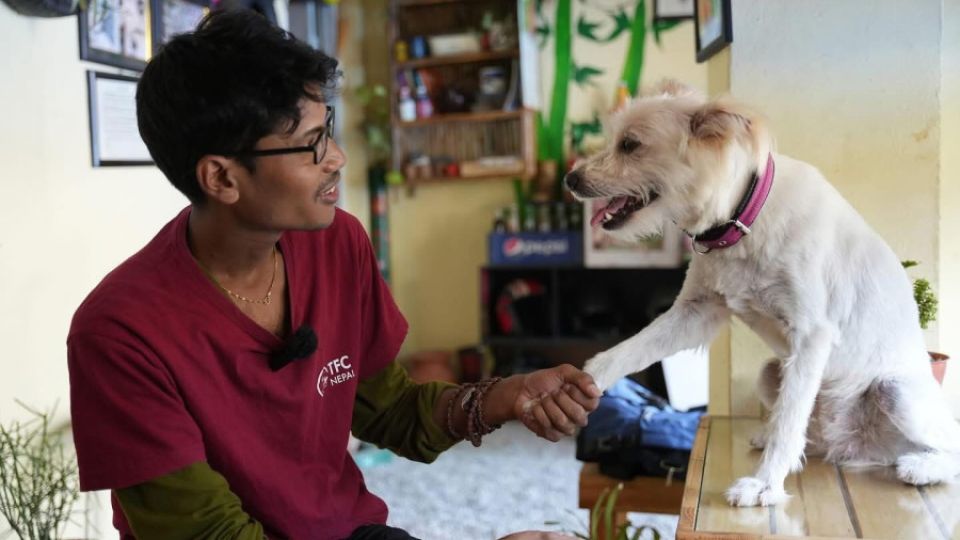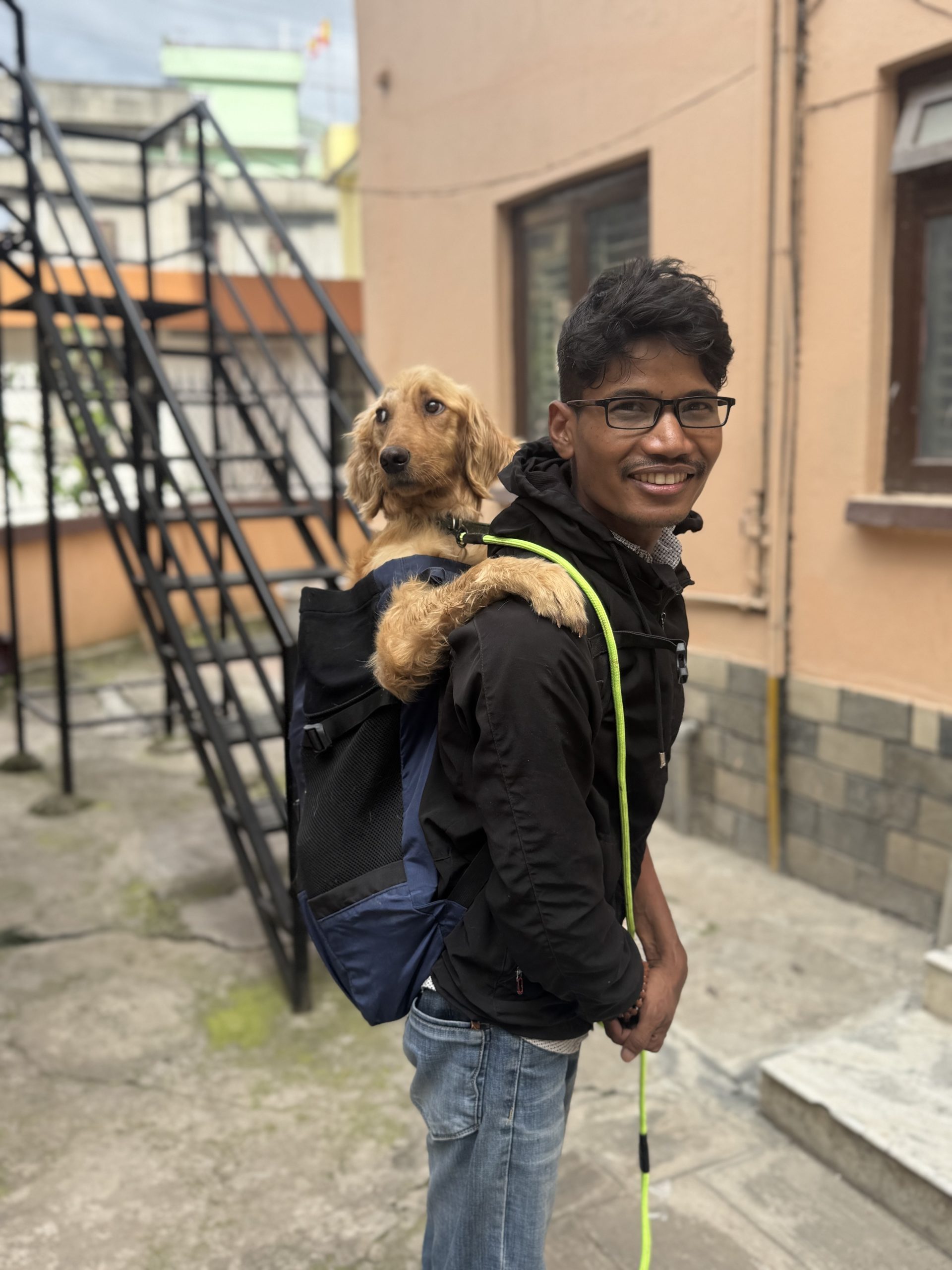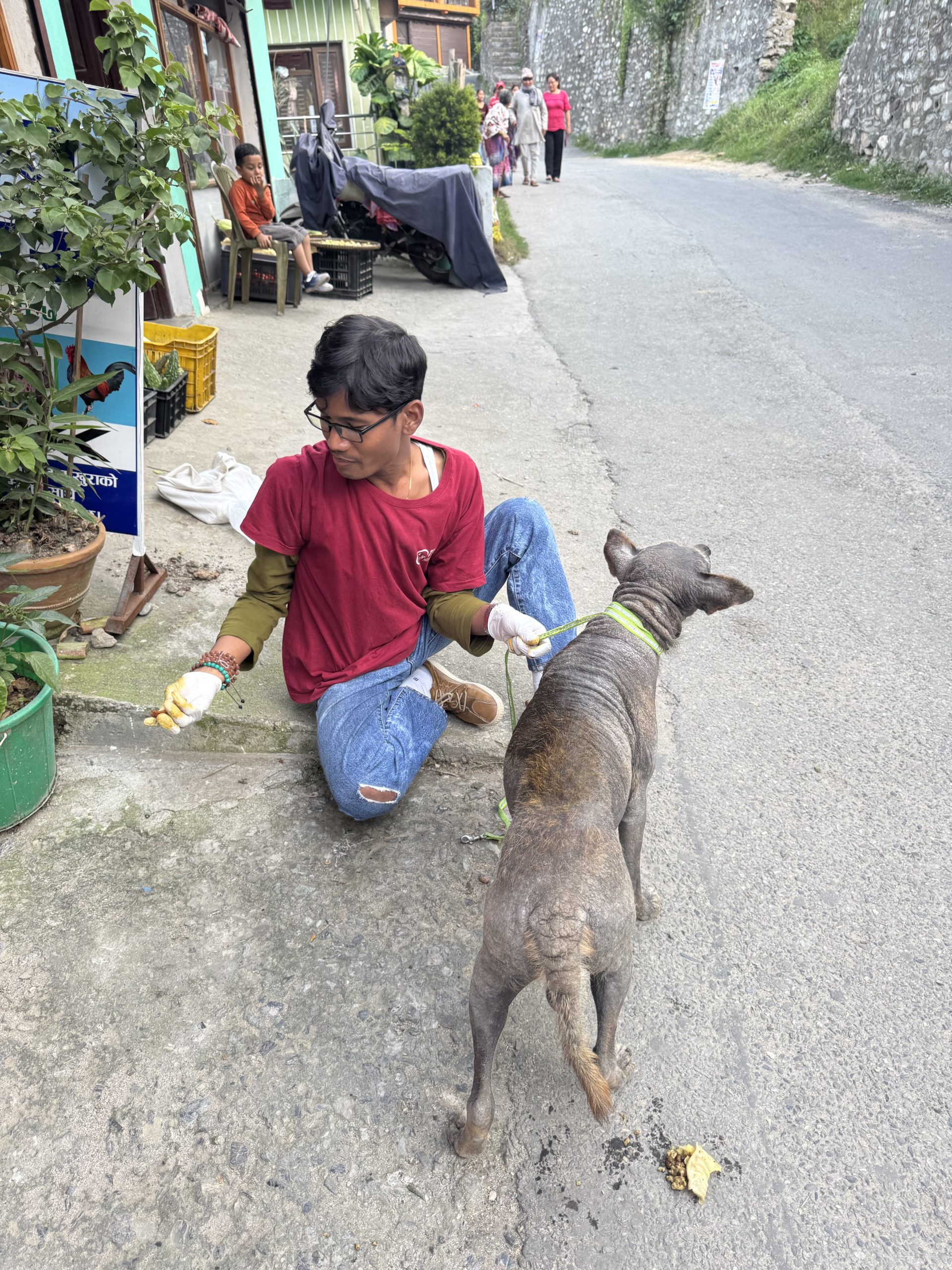
KATHMANDU – On the day Chiya Sewa opened in Mid Baneshwar’s Milan Chowk, there was no priest, ritual fire, or garlands. Instead, Tula Ram Rajbanshi, the founder, dipped the paw of a rescued street dog into ink and pressed it onto a piece of cloth; a quiet inauguration for a small teashop that would fund the rescue and care of stray animals.
Operated under TFC Nepal, a non‑profit organization that rescues and rehabilitates poor and injured animals, the teashop employs three workers, and Rajbanshi himself serves customers too, while sheltering a few rescued dogs. It serves raithane (indigenous) dishes. Every order, from a steaming cup of tea to a plate of veg sausage, helps cover rabies vaccinations, sterilisation drives, and emergency medical care for dogs across Nepal. Rajbanshi explains, “This way the customers themselves provide sewa (service) to dogs.”
Rajbanshi’s journey into animal welfare began years before Chiya Sewa. He grew up in a rural family where pets were not just animals but part of life. “In my village, there were no facilities to treat animals,” he says, recalling how villagers lacked the mindset that animals deserved medical care. He pursued a Diploma in Animal Science, but initially did not plan to open his own space.
In college, the practical sessions often involved treating street animals. While travelling outside Kathmandu, he repeatedly saw stray dogs injured on the Mahendra Highway; many were dying from untreated wounds. “Inside Kathmandu, many animal lovers and organizations are working for their betterment,” he explains, “but outside, the dogs have nothing.” This realisation eventually led him not only to treat animals but also to think deeply about sustainability.
Every rupee earned at Chiya Sewa serves a purpose. When the 2023 earthquake struck Jajarkot, Rajbanshi travelled there, rescuing stray dogs and ensuring they received care. He noticed almost no puppies, and he learned from the locals that female dogs were often thrown into the Bheri River, while male dogs were kept.
Recognizing that changing such deep‑rooted practices in Karnali would take years, he focused on an immediate solution: confining and sterilizing female dogs to prevent further suffering. They ran two mass sterilisation drives in the following years: 162 dogs in the first year and 190 in the second. All were funded from the teashop’s earnings.
A donation box sits atop a counter, occasionally collecting loose change from sympathetic visitors. But as Rajbanshi emphasises, “The rest of the earned money is used for vaccinations and other treatment.”

One of the bigger messages behind Chiya Sewa is independence. Many NGOs and INGO‑run welfare organizations in Nepal rely on foreign funds, but Rajbanshi wanted to show that local initiatives can sustain themselves through small enterprises. “I didn’t want to depend on international funding,” he says. “What if they stop providing? That is why I considered opening my food‑and‑tea space with an animal welfare mission.”
In this, TFC Nepal plays a pivotal role. As a non‑profit organisation, it emphasises animal rescue, rehabilitation, and education. It works in schools and colleges alongside Chiya Sewa to educate young people about how animal welfare should not be charity‑only; it can also be integrated into everyday businesses. Rajbanshi collaborates with TFC Nepal to show documentaries in the classroom and spark ideas about how one can do charity by doing their own business.
At first, there was scepticism. Some locals assumed only dog lovers would visit Chiya Sewa; others were unsettled by stray dogs lingering near tables. Rajbanshi addresses this quietly: “Many people dislike the presence of stray dogs, or demand they be shifted elsewhere.” Gradually, people began to understand that all are welcome. Whether someone comes simply for food or to spend time with the rescued dogs, they are welcomed wholeheartedly.
Rajbanshi is also open about how starting Chiya Sewa has changed him. “I’ve become free from depression, free of the mindset that I’ll only be able to help street dogs if people fund me,” he says. Before the teashop, he often felt depressed, burdened with pending medical bills for severely injured animals. Now he can fund their rescue—at least to some extent.
One particular moment stands out. In Birtamode, he rescued a dog named Kanchi, who had a damaged liver, a stomach full of fluid, and kidney problems. He decided to bring her to Kathmandu for treatment, but transporting her proved almost impossible. Public buses refused to carry them; some drivers let him in only to tell him later to get out once they realised the dog was a stray.

Strayed on the roadside, he told the dog, “I’m trying to save you, but this is what has happened.” To his surprise, the once‑aggressive Kanchi rested her head quietly on his lap. Eventually, a sympathetic driver offered them a ride in an old vehicle.
After months of treatment in Kathmandu, Kanchi recovered. When Rajbanshi returned her to Birtamode, she followed him back to his hotel and even slept outside his door. On the third day, he brought her back to the city. Today, Kanchi stays with him in his home Jawalakhel as a beloved companion.
Chiya Sewa has been operating for roughly eight months since its small launch. Rajbanshi believes the concept can be scaled. “In the future, I hope to open such a space outside Kathmandu, too—for example, in Nepalgunj. Then, the money earned can also go towards the dogs right there.”
He is exploring ways to replicate this model in other towns, aiming not just to open more teashops but to spread a mindset: social enterprises that support local animal rescue, rather than relying solely on external aid.
When asked how he balances running a business with animal welfare work, Rajbanshi offers a measured reply. In the early months, revenue was sometimes insufficient, making treatment and rescue difficult to finance. To bridge the gap, he worked as a private vet. Now, he says, things have stabilised, and Chiya Sewa generally covers its operations. “I didn’t open this business to grow it like a corporate venture,” he says. “It’s for the animals, and it gives me satisfaction.”
Chiya Sewa is a microcosm of sustainable social action. In this space, a cup of tea becomes part of animal welfare, where everyday commerce supports rescue operations, and where local involvement matters more than international grants.
It poses a question: Can more ordinary businesses be built with this hybrid model? Can cafés, bakeries, or local shops elsewhere support local causes in Nepal through self‑sufficiency? Rajbanshi hopes so—and he is already working towards it through TFC Nepal’s education programmes.


